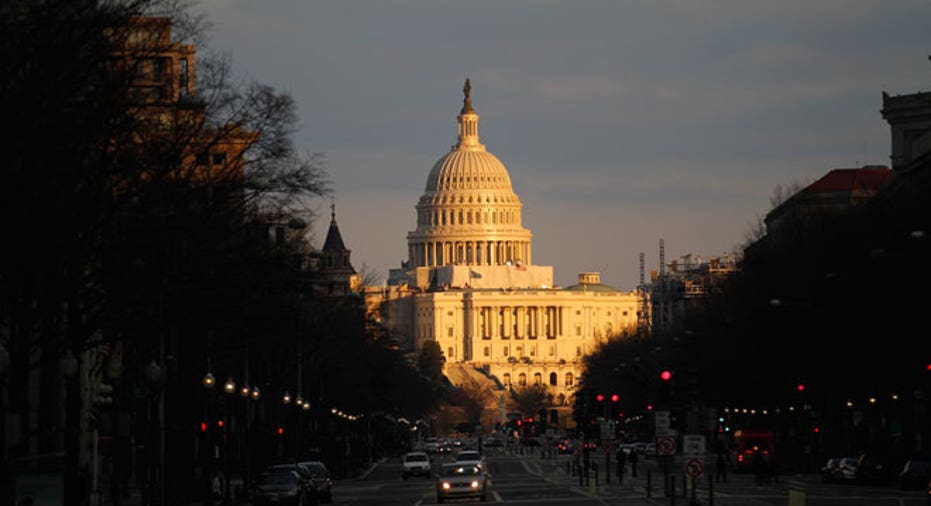Looming Threats No Match for Partisan Politics

Sixteen months ago, partisan politics allowed the once-unthinkable to happen -- Standard & Poor's downgraded the U.S. credit rating after repeated warnings that the unprecedented move was forthcoming if elected officials didn't get their act together.
They didn't.
Now economists are virtually unanimous in their assessment that the U.S. faces another recession if these same politicians can't agree on a deal to prevent the economy from falling over the 'fiscal cliff,' the sweeping tax increases and across-the-board budget cuts set to take effect after January 1.
Apparently no looming threat is big enough or frightening enough to break the partisan logjam that seems to fuel the Washington, D.C., political cycle.
The consensus among non-partisan observers is that this latest round of political theater will almost certainly result in another Band-Aid, a temporary fix that will stave off the worst of the potential economic fallout while providing maximum political cover for elected officials eyeing re-election.
"It is a tough predicament for both sides. Obama was elected on the promise of sticking it to the rich and (Republican Speaker of the House John) Boehner was promising 'No new taxes,'" said Anthony Sanders, professor of finance at George Mason University.
"Neither side really wants a middle ground, but Boehner is more likely to capitulate. After all, who gets elected to Congress by cutting entitlements?" Sanders asked, rhetorically.
In other words, political considerations will take precedence over the long-term health of the economy, and the cycle will start all over again.
On Tuesday Boehner signaled his willingness to raise taxes on those making more than $1 million a year. Despite the fact that, according to Boehner's office, such a tax increase would not impact 99.81% of tax payers, the compromise was met with immediate howls of rejection by the staunch anti-tax wing of the Speaker's party. President Obama, meanwhile, had earlier raised his ceiling from $250,000 to $400,000 for those for whom he would allow the Bush-era tax cuts to expire, drawing criticism from liberal members of his party.
In both cases the number of impacted Americans is minimal, ostensibly easing the political fallout on those -- members of Congress -- who will ultimately have to approve some form of compromise if the fiscal cliff is to be avoided.
Most analysts feel a compromise can and will be reached that will raise taxes on the wealthiest Americans. It was a centerpiece of Obama's successful re-election campaign and polls show most Americans favor such an increase to help reduce the $16 trillion national debt.
Predictably, the remaining sticking points are once again tied to spending cuts and entitlement reform.
We've seen this movie before.
The Cycle Repeats Itself
Two years ago a comprehensive budget deficit reduction plan offered by the National Commission on Fiscal Responsibility and Reform, better known as the Bowles-Simpson Committee, was summarily rejected by the committee itself, a victim of a bizarrely self-defeating requirement that 14 of the 18 commission members approve the document.
To this day, the Bowles-Simpson report remains the most detailed, bipartisan effort to slash the U.S. deficit through a balanced mix of tax increases and budget cuts. Perhaps most importantly the committee took on entitlement reform head on, mandating sweeping cost controls to the vast and hugely popular Medicaid program as well as significant adjustments to Social Security, including raising the eligibility age.
The frustrating failure of Bowles-Simpson offered a preview of what was to come, however. The summer of 2011 will long be remembered for a series of political debacles that brought the U.S. economy to where it sits today, at the edge of the fiscal cliff.
Amid bitter negotiations to raise the U.S. debt ceiling, usually a routine annual vote, Obama and Boehner, fully aware of the threat of a credit downgrade, failed to reach a 'grand compromise' on deficit reduction. Instead, the two masterminded the formation of a congressional 'super committee' charged with cutting $1.2 trillion from the deficit or else triggering massive budget cuts called sequestration set to take effect Jan. 1, 2013, a deadline since dubbed the fiscal cliff.
The super committee had about four months to achieve its Herculean task, so no one was surprised when the effort failed miserably.
This chain of events has created a cycle of inevitability, one that seems undeterred by ever-higher stakes, this time a recession that could put millions of Americans out of work and reverse what exists of a fledgling economic recovery.
On Wednesday the White House issued detailed criticisms of Boehner's latest compromise proposal, known as Plan B. Senior White House officials accused Boehner of derailing negotiations by offering a plan that the president would surely veto. Boehner's office countered by describing White House objections to Plan B as "bizarre and irrational."
The dueling press conferences and accusations of bad faith negotiations will only become more frequent as the January 1 deadline approaches, until finally a compromise is reached that will undoubtedly postpone any hard decisions until some future deadline.
And the cycle will begin again.



















